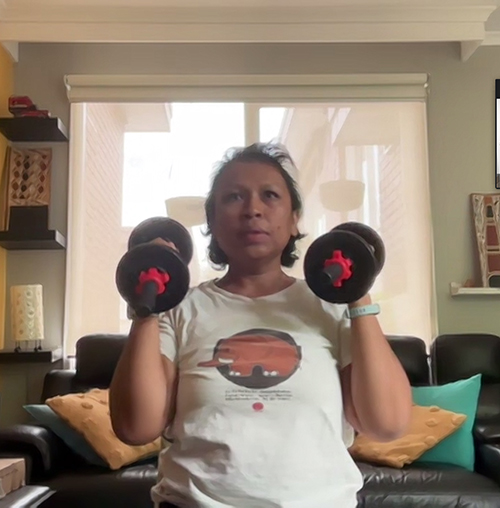Exercising power over post-cancer treatment side effects
14/07/2025

Mirana Ramialison – LION Study participant
The Lion-RCT study is investigating whether a personalised, supervised, live-remote exercise program helps cancer survivors who continue to experience debilitating side effects of their cancer treatment.
Associate Professor Eva Zopf, Head of the Cancer Exercise Lab at our Cabrini Cancer Institute, is recruiting participants to the study, to help combat the common but little discussed persistent side effects that occur post-curative cancer treatment.
It is designed to target four of the common side effects: fatigue, perceived low physical functioning in daily life, anxiety or depressive symptoms, and chemotherapy induced peripheral neuropathy.
As part of the study, participants receive a free 12-week online exercise program tailored to their main side effect.
“There’s a lot of focus on helping patients get through their treatment, and then we sometimes forget that post-treatment phase where a lot of individuals still struggle,” A/Prof said. “Patients are then in this position where they’re no longer getting clinical care.
“These side effects can actually last for quite some time after completing treatment and can really impact their quality of life.”
A/Prof Zopf is leading the international multisite LION-RCT study, funded by the European Union and NHMRC. She hopes to build on already published exercise oncology research and demonstrate the cost-effectiveness of an exercise intervention for cancer survivors.
“Over the past 30-40 years there has been a rapid increase in research looking at the effects of exercise in people diagnosed with cancer,” A/Prof Zopf said. “And we know now that exercise can be very beneficial at counteracting some of the disease and treatment-related side-effects of cancer.
“Managing these side-effects can help patients tolerate and complete their chemotherapy better and improve their quality-of-life post-treatment.
“But in this study, we hope to understand the cost-effectiveness of delivering a live-remote exercise intervention for cancer survivors on health-related quality of life and treatment-related side effects, in the hope that we can influence the future inclusion of post-treatment supervised exercise into medical guidelines for these patients.”
When Kate Middleton recently revealed on a royal visit to a cancer centre in England that she was failing to “function normally” post curative cancer treatment, the confession came as no surprise to A/Prof Zopf.
The Princess of Wales told the group that: “Everybody expects you to be better – go! But that’s not the case at all. You put on a sort of brave face, stoicism through treatment. Treatment’s done, then it’s like ‘I can crack on, get back to normal’ but actually the phase afterwards is really difficult. You’re not able to function normally at home as you perhaps once used to. You have to find your new normal and that takes time”.
Participant in the LION-RCT study and breast cancer survivor, Mirana Ramialison, said her post-cancer experience mirrored the Princess of Wales’, and said that despite sounding counterintuitive, exercising as part of the study made a huge difference to her post-cancer symptoms.
“I knew exercise was good in theory, but I didn’t realise how important it was going to be,” she said. “It was as important as my treatment for the cancer.
“I could go back to attending work conferences, travel internationally, and be there more for the kids as well.”
The exercise component of the LION-RCT study is delivered remotely, so the study is open to people living across the whole of Victoria.